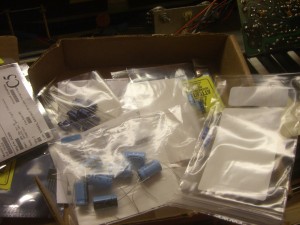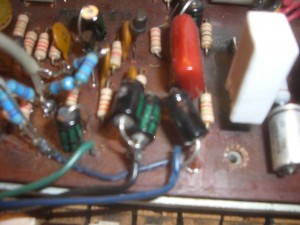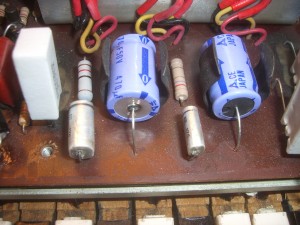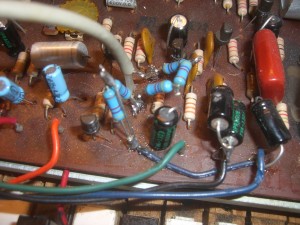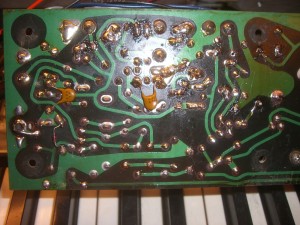I was going to call this post “A portrait of an electrical engineer as a young man (or woman)” but decided against it. I’ve got nothing on James Joyce, neither in loquaciousness nor confusing writing.
Anyway, I have been pondering what kind of employee I would hire out of school for an electrical engineering position. There are some basic skill sets that will allow just about any young engineer to succeed if they have these skills (the best situation) or at least appear they will succeed if written on their resume (not the best situation). Either way, let’s look over what a new grad should have on their utility belt before going out into the scary real world.
- Conceptual models of passive components — This has been one of the most helpful things I have learned since I have left school…because this kind of thinking is not taught in classrooms (at least it isn’t in the curriculum). The idea is to conceptualize what a component will do, as opposed to what the math is behind a certain component or why the physics of material in a component give it certain properties. Why does this matter? When you’re looking at a 20 page schematic of something you’ve never seen before, you don’t care what kind of dielectric is in a capacitor and how the electric field affects the impedance. Nope, you care about two things: What is the value and how does it affect the system. The first question is easy because it should be written right next to the symbolic notation. The second is different for each type of passive component you might encounter. Let’s look at the common ones
- Resistors — The best way I’ve found to think of resistors is like a pipe. The electrons are like water. The resistance is the opposite of how wide the pipe is (if the resistance is higher, the pipe is smaller, letting fewer electrons through in the form of current). Also, the pressure (voltage) it takes to get water (electrons, current) through a pipe (resistor) will depend on the thickness of the pipe (resistance). Well whaddaya know? V=IR!
- Capacitors — At DC, a capacitor is essentially an open circuit (think a broken wire). If you apply charge long enough (depending on the capacitance), it can consume some of that charge; after it is charged it will once again act like an open circuit. When considering AC (varying) signals, the best way to think about a capacitor is like a variable resistor. The thing controlling how much the capacitor will resist the circuit is the frequency of the signal trying to get through the capacitor. As the frequency of the signal goes up, the resistance (here it is called “impedance”) will go down. So in the extreme case, if the frequency is super high, the capacitor will appear as though it is not there to the signal (and it will “pass right through”). Taking the opposite approach helps explain the DC case. If the signal is varying so slowly that it appears to be constant (DC), then the impedance of the capacitor will be very high (so high it appears to be a broken wire to the signal).
- Inductors — Inductors have an opposite effect as capacitors and provide some very interesting effects when you combine them in a circuit with capacitors. In their most basic form, inductors are wires that can be formed into myriad shape but are most often seen as spirals. Inductors are “happy” when low frequency signals go through them; this means that the impedance is low at low frequencies (DC) and is high at high frequencies (AC). This makes sense to me because if the signal is going slow enough, it’s really just passing through a wire, albeit a twisty one. An interesting thing about electrons going through a wire is that when they do, they also product tiny magnetic fields around the wire (as explained by Maxwell’s Equations). When a high frequency signal tries to go through the inductor, the magnetic fields are changing very rapidly, something they intrinsically do not want. Instead it “slows” the electrons, or really increases the impedance. This “stops” higher frequency signals from passing through depending on the inductance of the inductor and the frequency of the signal applied. Looking at the how they react to different frequencies, we can see how inductors and capacitors have opposite effects at the extremes.
- Diodes — I think of diodes as a one way mirror…except you can’t see through the one way until you get enough energy. The one way nature is useful in blocking unwanted signals, routing signals away from sensitive nodes and even limiting what part of a varying signal will “get through” the diode to the other side.
- Transistors — I always like thinking of transistors as a variable resistor that is controlled by the gate voltage. The variable resistor doesn’t kick in until the gate voltage hits a certain threshold and sometimes the variable resistor also allows some energy to leak to one of the other terminals.
- C coding — Sorry to all you analog purists out there, but at some point as an engineer, you need to know how to code. Furthermore, if you’re going to learn how to code, my personal preference for languages to start with is C. Not too many other languages have been around for as long nor are they as closely tied to hardware (C is good for writing low level drivers that interpret what circuits are saying so they can talk to computers). I’m not saying higher level languages don’t have their place, but I think that C is a much better place to start because many other languages (C++, JAVA, Verilog, etc) have similar structure and can quickly be learned if you know C. Even though the learning curve is higher for C, I think it is worth it in the end and would love to see some college programs migrate back towards these kinds of languages, especially as embedded systems seem to be everywhere these days.
- How an op amp works — I set the op amp apart from the passives because it is an active component (duh) and because I think that it’s so much more versatile that it’s important to set it apart conceptually. I’ve always had the most luck anthropomorphizing op amps and figuring out what state they “want” to be in. Combining how you conceptually think about op amps and passives together can help to conceptualize more difficult components, such as active filters and analog to digital converters.
- The ability to translate an example — A skill that nearly every engineering class is teaching, with good reason. Ask yourself: are homework problems ever THAT much different from the examples in the book? No. Because they want you to recognize a technique or a idiosyncrasy in a problem, look at the accepted solution and then apply it to your current situation. Amazingly, this is one of the most useful skills learned in the classroom. Everyday engineering involves using example solutions from vendors, research done in white papers/publications and using even your old textbooks to find the most effective, and more importantly, the quickest solution to a problem.
- High level system design — This is similar to the first point, but the important skill here is viewing the entire picture. If you are concentrating on the gain of a single amplification stage, you may not notice that it is being used to scale a signal before it goes into an analog-to-digital converter. If you see a component or a node is grounded periodically, but ignore it, you may find out that it changes the entire nature of a circuit. The ability to separate the minutiae from the overarching purpose of a circuit is necessary to quickly diagnose circuits for repair or replication in design.
- Basic laws — It is amazing to me how much depth is needed in electrical engineering as opposed to breadth. You don’t need to know all of the equations in the back of your textbook. You need to know 5-10; but you need to know them so well that you could recite them and derive other things from them in your sleep. A good example would be Kirchoff’s laws. Sure, they are two (relatively) simple laws about the currents in a node and the voltage around a loop, but done millions of times and you have a fun little program called SPICE.
- Budgeting — There are many important budgets to consider when designing a new project. In a simple op amp circuit, there are many sources of error and inefficiencies. Determining and optimizing an error budget will ensure the most accurate output possible. Finding and determining areas that burn power unnecessarily must be discovered and then power saving techniques must be implemented. The cost is another consideration that is usually left to non-engineering, but is an important consideration in many different projects. Finding cost effective solutions to a problem (including the cost of an engineer’s time) is a skill that will make you friends in management and will help you find practical solutions to many problems.
- Math — Ah yes, an oldy but goody. Similar to the passive components, having a conceptual notion of what math is required and how it can be applied to real life situation is more important than the details. Often knowing that an integral function is needed is as important as knowing how to do it. And similar to the basic laws, you don’t need to know the most exotic types of math out there. I have encountered very few situations where I need to take the third derivative of a complicated natural log function; however, I have needed to convert units every single day I have been an engineer. I have needed simple arithmetic, but I’ve needed to do it quickly and correctly. Sure, you get to use a calculator in the real world, but you better learn how to use that quickly too, because your customers don’t want to wait for you to get out your calculator, let alone learn how it works.
Each of these skills could be useful in some capacity for a new electrical engineer grad. There are many different flavors of engineering and the skills listed above are really modeled off what would be good for an analog system engineer (who develop commercial or industrial products). However, a future chip designer and even a digital hardware engineer all could benefit from having the skills listed, as it is sometimes more important to be open to new opportunities (especially given the possibility of recession and potential shifting of job markets).
Did I miss anything? Do you think there are other skills that are necessary for young electrical engineers? What about general skills that could apply to all young engineers?
[xyz_lbx_default_code]
